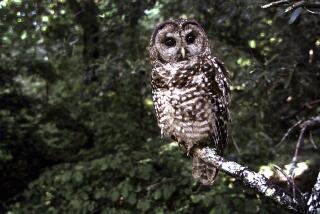COLUMN RIGHT : Endangering A Species Our Own : The act should be amended so human welfare comes first.
- Share via
If Shakespeare’s Marc Antony were to examine the Endangered Species Act of 1973 and the spotted owl contretemps, he would be compelled to reiterate from Julius Caesar’s funeral oration:
O judgment! thou art fled to brutish beasts / And men have lost their reason.
The act propagates a pestiferous imbalance between the earthbound benefits of economic growth and human well-being, and the protection of endangered or threatened fish, wildlife and plants. Wholesale amendments are required to stand the public interest upright, as President Bush and Secretary of the Interior Manuel Lujan Jr. have suggested.
Generally speaking, the act blocks any federal action, including leasing, selling or licensing, that might jeopardize the existence or critical habitats of endangered or threatened species. (A species is “endangered” if extinction is impending; it is “threatened” if extinction is likely in the foreseeable future.)
But why should the nation shield endangered or threatened species en bloc from such valuable federal activities as the sale of timber, or of oil and gas leasing, or the licensing of hydroelectric projects? Concededly, Congress decreed that these species are invariably of “aesthetic, ecological, educational, historical, recreational, and of scientific value to the nation and its people.” But a decree is no substitute for empiricism.
Does the spotted owl possess aesthetic, educational, historic or scientific value in its natural habitat that could not be duplicated in captivity? What is the ecological benefit of the snail darter? Is every plant root or mollusk important to science or pleasure? What is the contribution of the red squirrel to ecological balance? These salient questions are foolishly unasked in the Endangered Species Act.
Numerous species of fish, wildlife and plants in the United States perished before 1973 because of economic growth without ushering in the Four Horsemen of the Apocalypse. The act falsely postulates that, after 1973, the consequences of extinction would be disastrous; it erects an indomitable legal fortress around all endangered or threatened species, and it generally forecloses any inquiry into the benefits of protecting species in their natural habitats.
The act robotically garlands endangered or threatened species in lieu of federally assisted economic or scientific activity--even if also environmentally beneficial--but for two thin exceptions: the secretary of the interior may consider economic impact in specifying the critical habitat of a threatened but not an endangered species, and a five-member majority of a seven-member endangered species committee may authorize an exemption from the act under super-strict conditions. Only one exemption has passed the committee.
Frequently, tens of thousands of jobs are at stake, illustrated by the timber cutting curtailed by listing the spotted owl as a threatened species. Workers should not be insouciantly sacrificed for a handful of lyrical worshippers of pristine life who obtain visual delight from an occasional glimpse of the owl. California’s Board of Forestry further insulted worker interests by slashing private timber production to exalt the spotted owl with no proof of its contribution to either ecology or science.
The Endangered Species Act should be amended so that human welfare ordinarily is preferred to the welfare of lesser species. To overcome the presumption, it should demand hard proof that a particular endangered or threatened species brings aesthetic, ecological, educational, historical, recreational or scientific benefit in its natural habitat that clearly outweighs the economic, scientific, or environmental benefit of federal agency action.
A reversal of the act’s priorities is further justified by the primitive state of science used to identify a species as endangered or threatened. Thus, the snail darter was initially listed as endangered, but subsequent discoveries discredited the listing.
Moreover, many federal actions that may adversely affect an endangered or threatened species are environmentally friendly. The construction of hydroelectric power dams reduces the danger of global warming, acid rain and air pollution. Oil and gas leases reduce the volume of tanker traffic in U.S. waters.
Revising the Endangered Species Act to reflect a measured balancing of the competing ends of mankind would honor the banner of reason in Congress. As President Bush and Secretary Lujan recognize, much of contemporary environmentalism is nothing but nonsense on stilts.
More to Read
Sign up for Essential California
The most important California stories and recommendations in your inbox every morning.
You may occasionally receive promotional content from the Los Angeles Times.










